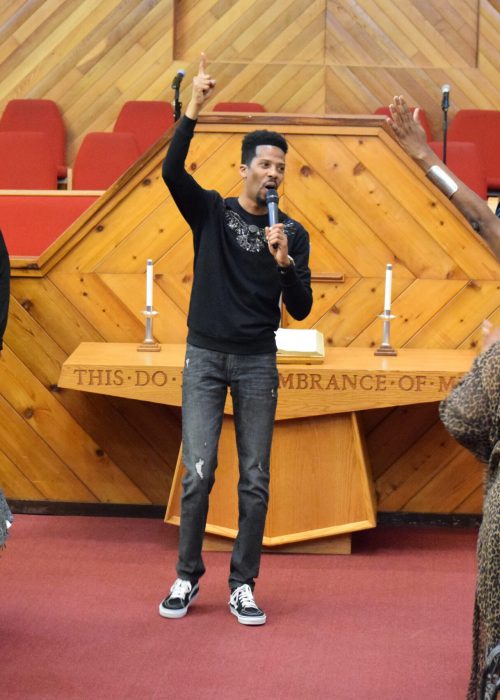Who We Are
Our Mission
DEVELOPING DISCIPLES
St. John is a spiritual experience committed to developing disciples of Jesus Christ through preaching and teaching the Word (of God), authentic worship (to God), intentional witnessing (about God), and committed work (for God).
“Therefore go and make disciples of all nations, baptizing them in the name of the Father and of the Son and of the Holy Spirit, and teaching them to obey everything I have commanded you. And surely I am with you always, to the very end of the age.”
–Matthew 28:19-20–
Our Vision
St. John seeks to be a preferred and trusted place of worship for many people of all ethnicities and cultures who are bound together by the uncompromising message and love of Jesus Christ.
Our Beliefs

God the Father
It is the testimony of both the Old and New Testaments and of the Christian Church that God is both One and Triune. The biblical revelation testifies that there is only one God and that He is eternally existent in three persons—Father, Son, and Holy Spirit.
The Son
It is the testimony of both the Old and New Testaments and of the Christian Church that God is both One and Triune. The biblical revelation testifies that there is only one God and that He is eternally existent in three persons—Father, Son, and Holy Spirit.
The Holy Spirit
It is the testimony of both the Old and New Testaments and of the Christian Church that God is both One and Triune. The biblical revelation testifies that there is only one God and that He is eternally existent in three persons—Father, Son, and Holy Spirit.
It is the testimony of both the Old and New Testaments and of the Christian Church that God is both One and Triune. The biblical revelation testifies that there is only one God and that He is eternally existent in three persons—Father, Son, and Holy Spirit.
Christ’s vicarious death on the cross paid the penalty for the sins of the whole world, but its benefits are only applicable to those who receive Jesus as their personal Savior and Lord. Healing—body, soul, and spirit—and all of God’s provisions for His saints, are provided for in the atonement, but these must be appropriated.
The Word of God declares clearly that salvation is a free gift of God, based on the merits of the death of His Son, and is appropriated by faith. Salvation is effected by personal repentance, belief in the Lord Jesus (justification), and personal acceptance of Him into one’s life as Lord and Savior (regeneration). The new life in Christ includes the privileges of adoption and inheritance in the kingdom of God’s beloved Son. Salvation is an act of free will in response to God’s personal love for mankind. It is predestined only in the sense that God, through His omniscience, foreknew those who would choose Him. It is secure in the eternal, unchanging commitment of God who does not lie and is forever the same. Salvation should produce an active lifestyle of loving obedience and service to Jesus Christ our Savior.
We believe that the Scriptures portray the life of the saint in this world to be one of balance between what is imputed to us as Christians and what is imparted to us according to our faith and maturity. Hence, God’s provision for His children is total, and the promises are final and forever. The shortcomings of the individual and of the Church are because of the still progressing sanctification of the saints. The Christian life is filled with trials, tests, and warfare against a spiritual enemy. For those abiding in Christ until their deaths or His return, the promises of eternal blessing in the presence of God are assured. To remain faithful through all circumstances of life requires dependence upon the Holy Spirit and a willingness to die to personal desires and passions.
The goal of the Church is to make disciples of all nations and to present the saints complete in Christ. The five-fold ministry of Ephesians 4 governs the Church, the offices of elder and deacon, as well as other offices mentioned in scripture. Church policy is a balance between congregation and eldership authority, emphasizing the final authority of the Church leadership. It is essential to the life of the Church that scriptural patterns of discipline are practiced and that oversight for Church discipline, individual and corporate, is exercised by the leadership of the Church.
The Word of God enjoins on the Church two perpetual ordinances of the Lord Jesus Christ. The first, baptism, is the outward sign of what God has already done in the individual’s life and is a testimony to all that the person now belongs to Jesus. It is identification with Jesus and is effected in the name of the Father, the Son, and the Holy Spirit.
The Lord’s Supper is a commemoration of the death of the Lord and is done in remembrance of Him until He comes again; it is a sign of our participation in Him. Both institutions are restricted to those who are believers.
We affirm the bodily, personal, second coming of the Lord Jesus Christ, the resurrection of the saints, the millennium, and the final judgment. The final judgment will determine the eternal status of both the saints and the unbelievers, determined by their relationship to Jesus Christ. We affirm with the Bible the final state of the new heavens and the new earth.

